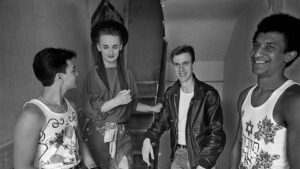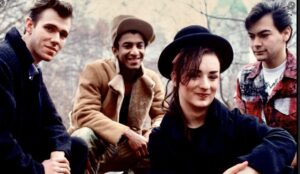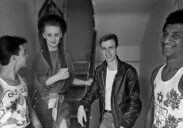
The UK excelled in glossy pop music in the 1980s, and undoubtedly one of our most successful exports was Culture Club, the legendary four-piece London band fronted by the attention-grabbing singer Boy George (George O’Dowd). A new documentary by esteemed director Allison Elwood (check out her brilliant doc on The Go-Go’s), Boy George and Culture Club, tells the story of the band’s rapid rise to worldwide fame and George’s subsequent descent into drug addiction.
You may think you already know all there is to know about Boy George and Culture Club. After all, George alone has published three autobiographies, and has never been shy about telling all to the press. If so, then be prepared for a feast of new stories and info. Elwood cleverly interviews each band member separately, giving George (lead singer), Jon Moss (drums and percussion), Mikey Craig (bass guitar) and Roy Hay (guitar and keyboards) the space to speak freely about the band’s journey.
Culture Club were formed in 1981 when Mikey approached Boy George in a club to form a band. George had just been sacked from Bow Wow Wow and was keen to continue singing, so he said yes. They then recruited punk drummer Moss – he’d previously played with The Damned, The Clash, The Stranglers and Adam & the Ants. From Moss’s initial meeting with George it was clear that there was a lot of sexual chemistry between the two men and a years-long romance began very shortly afterwards. This was to the dismay of fellow band recruits Mikey and Roy who rightly assumed the romance would get in the way of the band. The band members had very different musical influences – George was into Bowie, glam rock, Gladys Knight and goth, Jon punk, Mikey was heavily influenced by reggae and blues and Roy loved Stevie Wonder and The Isley Brothers – hence the band’s name Culture Club. George had a brilliant soulful voice and all the band were very talented. Fashion designer Sue Clowes created a unique look for the band to reflect their range of influences and legendary producer Steve Levine quickly came on board to polish their sound, a colourful mix of pop, soul and reggae. George’s striking androgynous looks were inspired by rock icons such as Siouxsie, Poly Styrene and Ari Up and guaranteed attention. A record deal with Virgin followed, and after a couple of single flops, a last-minute slot on Top of the Pops took Do You Really Want to Hurt Me? to the number one spot in the UK and then the US single charts. George proved a master at media soundbites and generating new looks by the week, so the band gained constant press coverage. The rest of the story is rock and roll history – the band offered a fun positive antidote to the seriousness of new wave and the new romantics. They achieved global success over the next four years until George went off the rails and developed a brutal addiction to heroin following the end of his relationship with Jon. This led to the band splitting up in 1986.

Elwood takes us back in time to a decade of fun, individuality and extravagance. She is skilled in getting her interviewees to open up in ways they haven’t before. George and Jon’s romance was always a secret from the public back in the day, but now Jon opens up about their love in a way he never has before. He’s refreshing, unscripted and talks from the heart, making this documentary feel special and not a PR-led production. George is the same as ever, his charisma, flippancy and sharp wit masking deep insecurities. Nevertheless, he remains entertaining. Theirs was a rollercoaster romance and the highs and lows fed into the lyrics of nearly all Culture Club’s greatest hits written by George. Elwood documents the Culture Club glory years up to 1986. A lot has happened with the band and its members since then but this time-capsule gives a rich seam of the purest content. The band’s candid interviews are complemented with a dazzling array of 80s pop excess footage – live performances, promo videos (Time – Clock of the Heart, Church of the Poison Mind, Karma Chameleon etc), archive interviews and film of screaming fans around the world. There is an undercurrent of 80s homophobia in some of the footage, both in various archive interviews and the resulting over-reaction in middle America to George’s famous comment “America, you know a good drag queen when you see one.” Who did they think he was before he said that?! Middle America’s current obsession with transphobia shows how little has changed in the past forty years – there’s just a different bogey man now. George’s descent into addiction is tough to watch – so much was thrown away at that point, including the band’s opportunity to perform at Live Aid. This is still a sore point for the other band members.
|
Boy George and Culture Club is a kaleidoscopic assault on the senses, fun and nostalgic and a reminder of the humanity that lies behind every band. Highly recommended.
|

